Your cart is empty
Subtotal:$0.00
When it comes to upgrading or replacing your vehicle's brake system, one crucial decision is choosing between drilled and slotted disc brake rotors. Both options offer advantages and cater to different driving needs, making the decision a matter of personal preference and specific requirements. In this comprehensive guide, we will delve into the characteristics, benefits, and drawbacks of drilled and slotted disc rotors to help you make an informed decision for your vehicle.
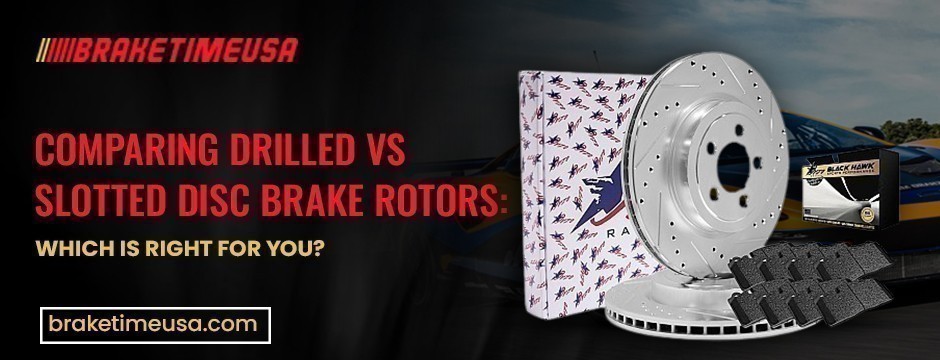
Drilled disc rotors are characterized by small holes drilled into the surface of the rotor, a design aimed at enhancing both performance and longevity. These holes serve several purposes, with the primary one being heat dissipation.
During intense braking, the friction generated between the brake pads and rotor can lead to high temperatures. The drilled holes help dissipate heat more efficiently, preventing brake fade and maintaining optimal performance even in demanding driving conditions. Moreover, the advantage of drilled rotors extends to their ability to reduce the weight of the rotor itself. The strategically placed holes create a lighter rotor, which, in turn, can contribute to improved handling and overall vehicle performance. The reduced weight not only benefits acceleration and deceleration but also positively impacts fuel efficiency.
Additionally, the drilled holes in the rotors serve a dual purpose by assisting in water dispersion. This feature is particularly valuable for wet weather conditions. By preventing water from accumulating on the rotor surface, the drilled rotors enhance wet braking performance. It reduces the risk of hydroplaning and ensures reliable stopping power in adverse weather scenarios. This makes drilled rotors a versatile choice for drivers who frequently encounter varied driving conditions.
The drilled design of disc brake rotors offers a multi-faceted approach to improving performance. From efficient heat dissipation to weight reduction and enhanced wet braking capabilities, drilled rotors prove to be a well-rounded choice for drivers seeking a balance between high-performance driving and adaptability to diverse environmental conditions.
However, it's essential to note that drilled rotors have their drawbacks. The holes may compromise the structural integrity of the rotor, making it more prone to cracking under extreme stress or heavy-duty use. Moreover, the drilled holes can accumulate brake dust and debris, potentially leading to increased wear on the brake pads.
Slotted disc brake rotors, on the other hand, feature grooves or slots cut into the rotor surface. These slots serve various purposes, primarily aiding in heat dissipation and gas ventilation. Like drilled rotors, slotted rotors help prevent brake fade by dissipating heat efficiently, ensuring consistent braking performance.
The slots in slotted rotors also play a crucial role in removing gases generated during the braking process. As the brake pads make contact with the rotor, gases can build up, creating a barrier between the pad and the rotor surface. The slots in slotted rotors act as channels, allowing these gases to escape and maintaining optimal pad-to-rotor contact.
One significant advantage of slotted rotors is their durability compared to drilled rotors. The absence of drilled holes preserves the structural integrity of the rotor, making slotted rotors more resistant to cracking and suitable for heavy-duty applications.
When it comes to performance, both drilled and slotted rotors offer unique advantages. Drilled rotors excel in dissipating heat quickly, making them an ideal choice for high-performance and track-oriented vehicles. The improved heat dissipation helps prevent brake fade during aggressive driving, ensuring consistent stopping power.
On the other hand, slotted rotors are known for their durability and reliability under heavy loads. They are less prone to cracking, making them suitable for trucks, SUVs, and vehicles used for towing or hauling. The slots also contribute to effective gas ventilation, enhancing overall braking performance.
It's important to consider your driving habits and the intended use of your vehicle when choosing between drilled and slotted rotors. If you frequently engage in spirited driving or track days, drilled rotors may be more suitable. For heavy-duty applications and reliability under stress, slotted rotors might be the better choice.
Beyond their undeniable performance benefits, aesthetics and maintenance play a pivotal role in the choice between drilled and slotted rotors. In the context of Drilled vs. Slotted rotors, Drilled rotors boast a distinct, high-performance appearance that resonates with automotive enthusiasts. The precision of the drilled holes contributes to a visually striking rotor surface, elevating the overall look of the braking system. However, this aesthetic appeal comes with a trade-off – the drilled holes can act as catchments for brake dust and debris. Consequently, owners of drilled rotors must be prepared for more frequent cleaning sessions to uphold the rotor's polished appearance and ensure it remains a visual highlight.
Slotted rotors offer a more understated and utilitarian aesthetic. The grooves or slots cut into the rotor surface provide a subtle yet purposeful design. While not as flashy as their drilled counterparts, slotted rotors have a timeless appeal. Importantly, the slots are inherently less prone to accumulating debris compared to drilled holes. This characteristic makes slotted rotors a more practical choice for vehicle owners who prioritize a clean and low-maintenance appearance. Choosing slotted rotors aligns with a preference for a polished look that withstands the test of time without demanding constant attention to cleanliness.
In the debate between drilled vs. slotted disc brake rotors, there is no one-size-fits-all answer. The choice ultimately depends on your driving preferences, vehicle type, and intended use. Drilled rotors offer excellent heat dissipation and a sporty appearance, making them suitable for high-performance driving. On the other hand, slotted rotors prioritize durability and reliability, making them ideal for heavy-duty applications.
Consider your driving habits, vehicle specifications, and maintenance preferences when making this decision. Whether you opt for the flashy drilled rotors or the robust slotted ones, upgrading your disc brake rotors is a step toward enhancing your vehicle's braking performance and overall driving experience. To buy these brake rotors, you can order them from Brake Time.
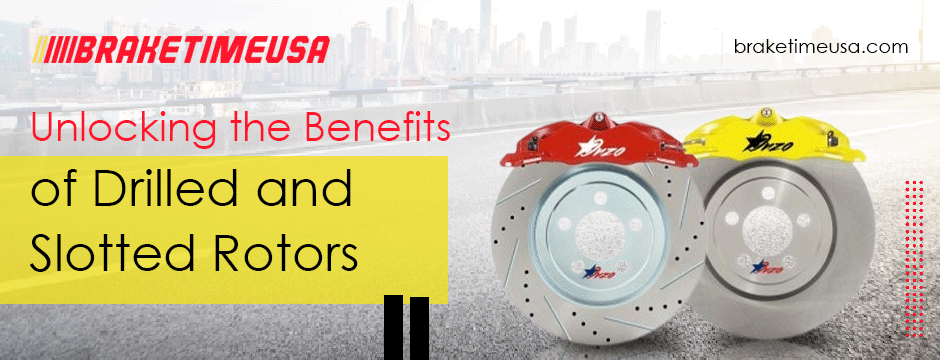 Mar 27, 2024Unlocking the Benefits of Drilled and Slotted Rotors
Mar 27, 2024Unlocking the Benefits of Drilled and Slotted Rotors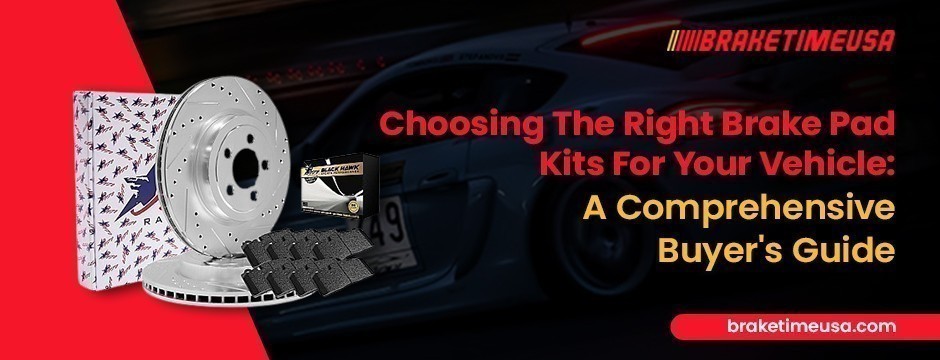 Mar 22, 2024Choosing The Right Brake Pad Kits For Your Vehicle: A Comprehensive Buyer's Guide
Mar 22, 2024Choosing The Right Brake Pad Kits For Your Vehicle: A Comprehensive Buyer's Guide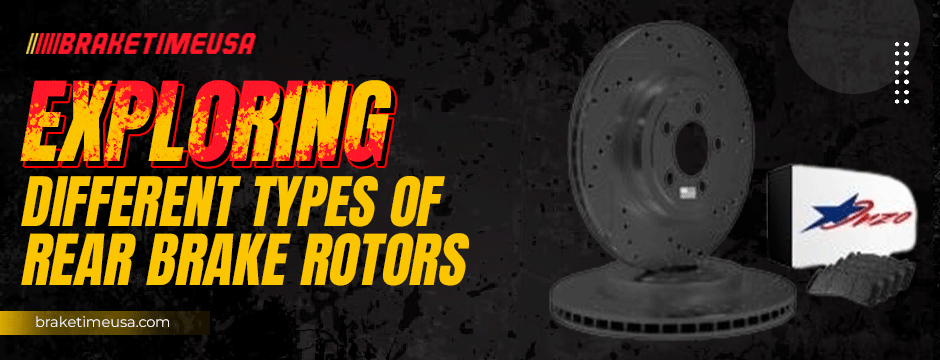 Mar 18, 2024Exploring Different Types of Rear Brake Rotors
Mar 18, 2024Exploring Different Types of Rear Brake Rotors Mar 6, 2024Comparing Drilled vs. Slotted Disc Brake Rotors: Which Is Right for You?
Mar 6, 2024Comparing Drilled vs. Slotted Disc Brake Rotors: Which Is Right for You?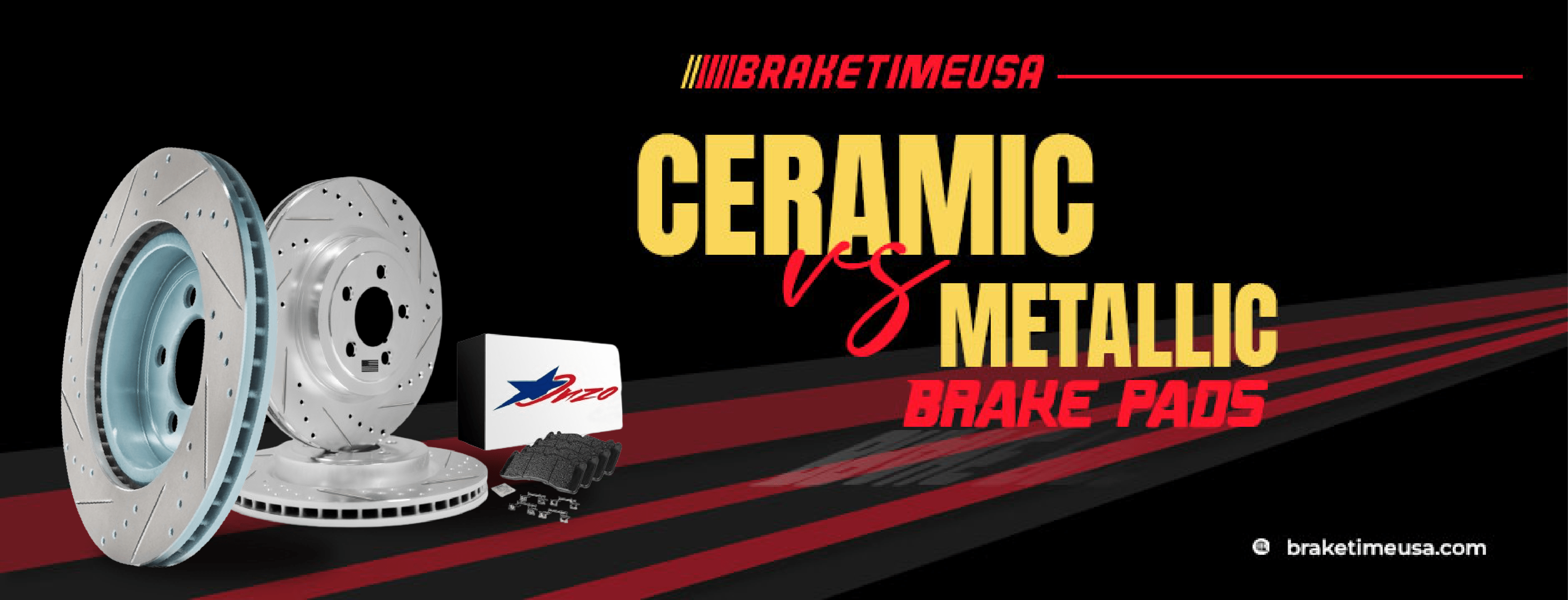
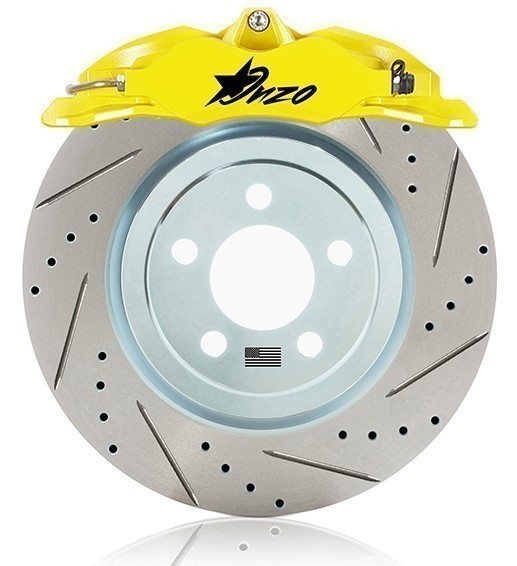 Feb 5, 2024Comprehensive Guide on How To Check Brake Pads and Rotors for Optimal Maintenance
Feb 5, 2024Comprehensive Guide on How To Check Brake Pads and Rotors for Optimal Maintenance© 2023 - 2024 Braketimeusa. All rights reserved.
